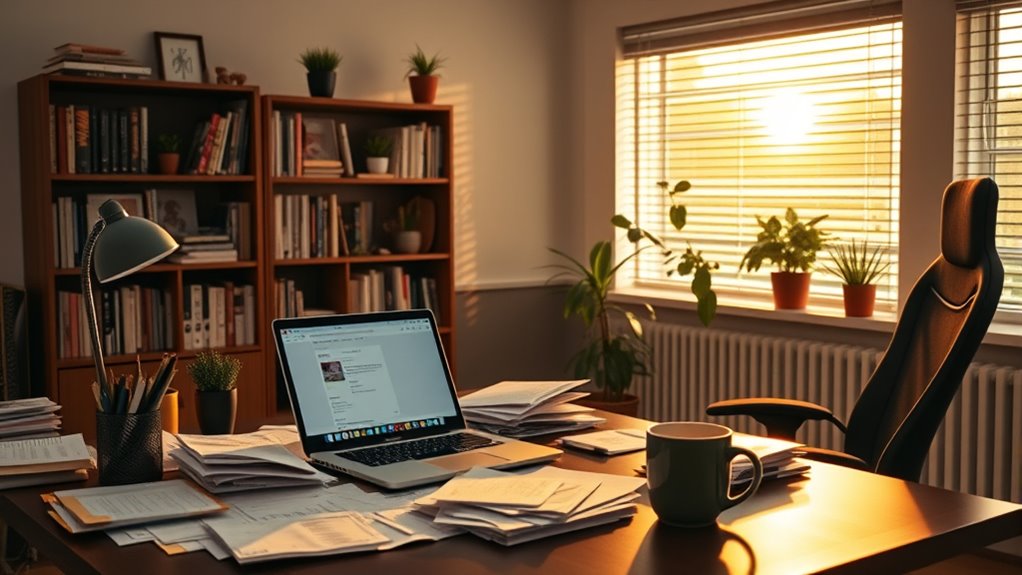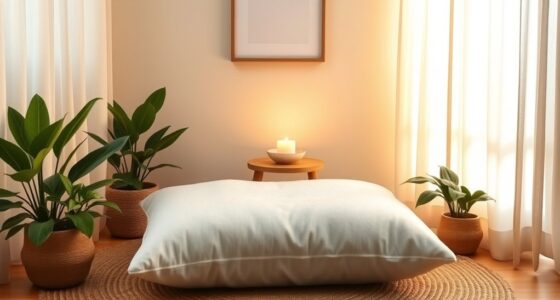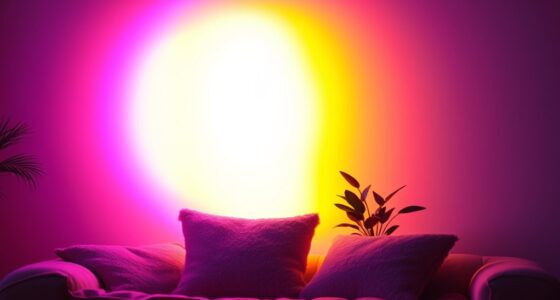A cluttered, poorly lit, or ergonomically flawed home office can slowly sap your focus and motivation without you realizing it. When your space is disorganized or overwhelming, your brain struggles to filter distractions, making it harder to concentrate. Low lighting and un ergonomic setups lead to fatigue and discomfort, further diminishing productivity. Personalization and noise levels also influence your mood and focus. Keep exploring to discover simple ways to transform your workspace into a true productivity hub.
Key Takeaways
- Cluttered and disorganized workspaces can increase stress and reduce focus, negatively impacting productivity.
- Poor lighting, especially insufficient natural light, decreases alertness and hampers mental clarity.
- Uncomfortable ergonomic setups cause physical discomfort, leading to distraction and fatigue.
- Excess noise and poor spatial layout create distractions, lowering concentration and efficiency.
- Lack of restorative spaces and environmental comfort can drain energy and hinder sustained work performance.
The Impact of Clutter and Organization on Focus

Clutter can considerably undermine your focus by overwhelming your senses and making it harder to concentrate on tasks. When your workspace is cluttered, your brain struggles to filter out distractions, reducing your efficiency. Implementing effective storage solutions helps keep your workspace tidy and minimizes visual chaos. Use organized filing systems to categorize documents and supplies, so everything has a designated place. This reduces the time spent searching for items and prevents clutter from piling up. A clean, well-organized home office creates a sense of calm and control, allowing you to focus fully on your work. Remember, a clutter-free environment isn’t just about aesthetics; it directly supports your mental clarity and productivity. Incorporating storage solutions can help maintain an organized workspace and boost your efficiency. Keep your workspace organized, and you’ll notice a significant improvement in your ability to concentrate.
How Lighting Affects Your Mental State and Efficiency
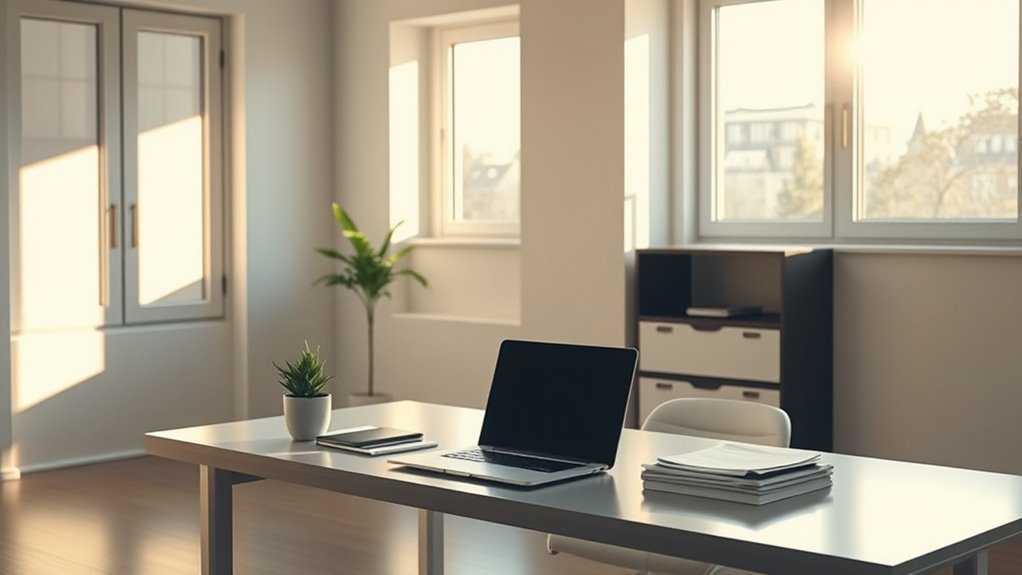
The lighting in your home office directly impacts your alertness and mood throughout the day. Bright environments can keep you more focused, while natural light boosts your overall sense of well-being. Consistent lighting prevents fatigue, helping you stay productive without unnecessary strain. Incorporating appropriate lighting options like adjustable lamps or daylight bulbs can further optimize your workspace for better mental clarity and energy.
Brightness Boosts Alertness
When your workspace is well-lit, your alertness levels naturally increase, making it easier to focus and stay productive. Bright lighting sharpens your mind and prevents fatigue. To optimize this, consider:
- Using task lighting to illuminate your work area directly, reducing eye strain.
- Incorporating mood lighting to create an energetic atmosphere, boosting motivation.
- Ensuring your lighting is adjustable, so you can change brightness levels based on your tasks.
- Avoiding dim or uneven lighting, which can cause drowsiness and reduce alertness.
Proper brightness helps your brain stay engaged and minimizes distractions. Bright environments signal your body to stay alert and ready to tackle tasks efficiently, keeping you focused throughout the day.
Natural Light Enhances Mood
Natural light does more than brighten your workspace; it substantially influences your mood and mental clarity. Exposure to natural illumination can boost feelings of happiness and reduce stress, helping you stay motivated throughout the day. Daylight exposure triggers the production of serotonin, the hormone linked to improved mood and focus. When your home office receives ample natural illumination, you’re likely to experience greater mental alertness and a sense of calm. Without enough daylight, you might feel sluggish or irritable, hindering your productivity. Incorporating large windows or positioning your desk near natural light sources can make a significant difference. Prioritizing natural light isn’t just about visibility—it’s about supporting your emotional well-being and keeping your mind sharp during work hours. Additionally, understanding the importance of mindfulness and presence can help you remain centered and focused while working in natural light.
Lighting Consistency Prevents Fatigue
Have you ever noticed how inconsistent lighting can drain your energy and fog your mind? Fluctuating light levels force your eyes to constantly adjust, leading to fatigue and reduced focus. To prevent this, guarantee your workspace has consistent lighting throughout the day. Here are four ways to achieve fatigue prevention through proper lighting:
- Use adjustable lamps to maintain steady illumination.
- Avoid sudden brightness changes when switching between tasks.
- Incorporate diffused lighting to reduce glare and harsh shadows.
- Keep ambient lighting uniform, avoiding overly bright or dim spots.
- Invest in professional lighting solutions designed to provide stable and uniform illumination throughout your workspace.
Consistent lighting helps stabilize your mental state, reduces eye strain, and boosts productivity. When your workspace is well-lit with steady illumination, you’ll stay alert longer and work more efficiently. Prioritize lighting consistency for sustained energy and sharper focus.
The Role of Color Choices in Workspace Motivation
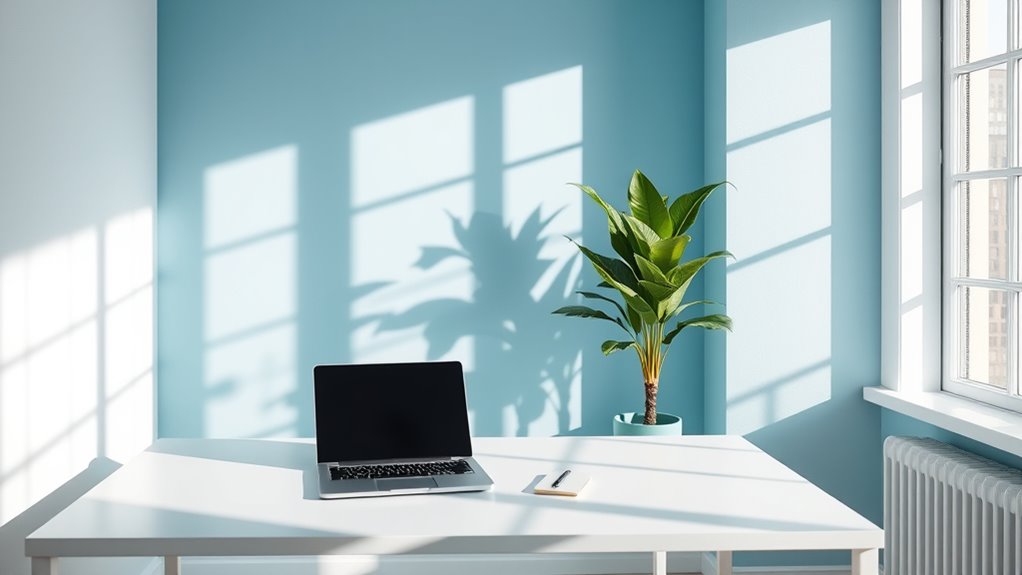
The colors you choose for your workspace can substantially influence your motivation and focus. Different hues evoke specific emotions and energy levels, impacting how productive you feel. Selecting motivating colors helps create an environment that keeps you engaged and efficient throughout your day. Incorporating mindful decluttering strategies into your workspace can also enhance focus by reducing visual distractions and promoting a sense of calm.
Impact of Color Psychology
Colors in your workspace can considerably influence your motivation and productivity, as they evoke specific psychological responses. Your choice of hue selection impacts your mood and focus through color influence. For example:
- Blue hues promote calmness and concentration, ideal for detail-oriented tasks.
- Red hues boost energy and urgency, helpful during deadlines but may cause stress if overused.
- Green hues foster balance and reduce fatigue, supporting long work sessions.
- Yellow hues inspire creativity and optimism, perfect for brainstorming or problem-solving.
Understanding the color influence allows you to tailor your workspace to support your goals. Selecting the right hues creates an environment that enhances your focus, mood, and efficiency, making your home office a more productive space. Recognizing the personality traits associated with different colors can further optimize your workspace environment.
Choosing Motivating Hues
Choosing motivating hues is essential because the colors you surround yourself with can directly influence your enthusiasm and drive. When selecting your workspace colors, prioritize creating a sense of color harmony that feels balanced and energizing. Bright, warm tones like yellows or oranges can boost positivity and creativity, while cooler shades like blues promote focus and calm. Incorporate motivational accents—such as a vibrant desk accessory or wall art—to add pops of energy without overwhelming the space. These accents can serve as visual cues that inspire productivity. Remember, the goal is to craft a color palette that energizes you without causing distraction. Thoughtful color choices help reinforce your motivation, making your home office a space where productivity naturally flourishes. Additionally, choosing color harmony can foster a harmonious environment that supports emotional well-being and effective communication.
Ergonomics and Its Effect on Productivity and Well-Being

Because proper ergonomics directly impacts your comfort and efficiency, paying attention to your workspace setup can markedly boost productivity and overall well-being. Using ergonomic accessories like adjustable chairs, monitor stands, and keyboard supports helps achieve posture optimization, preventing strain and fatigue. To improve your setup, consider:
- Adjusting your chair height so your feet rest flat on the floor
- Positioning your monitor at eye level to avoid neck strain
- Using wrist supports to reduce pressure during typing
- Incorporating footrests for better lower back support
- Selecting ergonomic tools designed to enhance comfort and support during long hours of work
These small changes promote better posture, reduce discomfort, and enhance focus. Prioritizing ergonomics isn’t just about comfort—it’s a smart strategy to stay productive and maintain your health during long work hours.
The Influence of Personalization and Decor on Work Attitudes
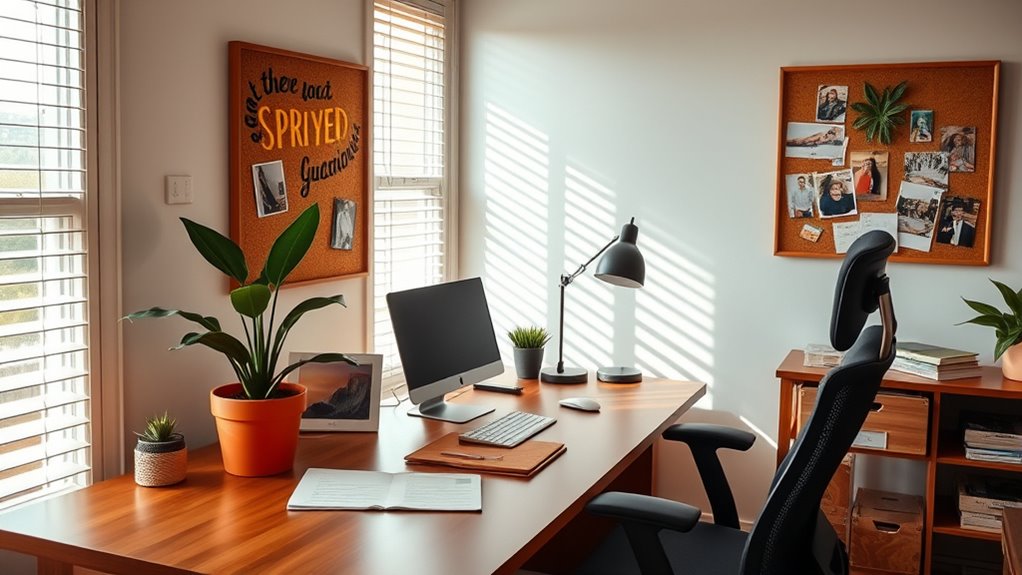
When your workspace reflects your personality through personalized decor, it can substantially influence your attitude toward work. Personal expression helps you feel more connected to your environment, fostering a positive workspace identity. By adding items that resonate with your interests or achievements, you create a space that motivates and energizes you. This sense of ownership promotes pride and engagement, making it easier to focus and stay productive. When your workspace aligns with who you are, it reduces stress and enhances your overall work attitude. Incorporating self watering plant pots can also contribute to a calming and inviting atmosphere, further supporting your mental well-being. Personalization transforms a generic area into a sanctuary that supports your mental well-being. Ultimately, a thoughtfully decorated workspace encourages a proactive mindset and reinforces your commitment to your tasks, boosting your work satisfaction and efficiency.
Noise Levels and Their Psychological Impact on Concentration
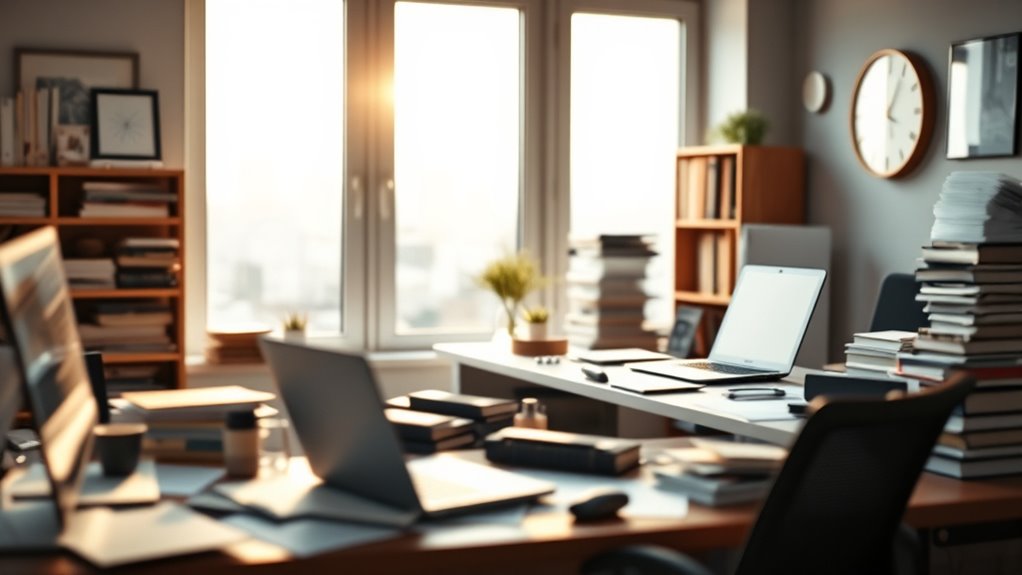
Noise levels in your home office can considerably influence your ability to concentrate and maintain productivity. Excessive noise or sudden disruptions can increase stress and reduce focus. To combat this, consider:
Managing noise in your home office boosts focus and reduces stress for better productivity.
- Installing acoustic panels to absorb sound and minimize echoes.
- Using sound masking devices that emit calming background noise to mask distracting sounds.
- Choosing a quiet corner or room away from household activity.
- Setting boundaries with family or roommates during work hours to limit interruptions.
- Incorporating noise control solutions, such as weatherstripping or soundproof curtains, can further enhance your environment.
Implementing these strategies creates a calmer environment, helping your mind stay engaged. Managing sound effectively reduces mental fatigue and enhances concentration, making it easier to complete tasks efficiently. Recognizing how noise impacts your psychology is essential for optimizing your workspace for productivity.
The Significance of Spatial Layout and Movement Flow
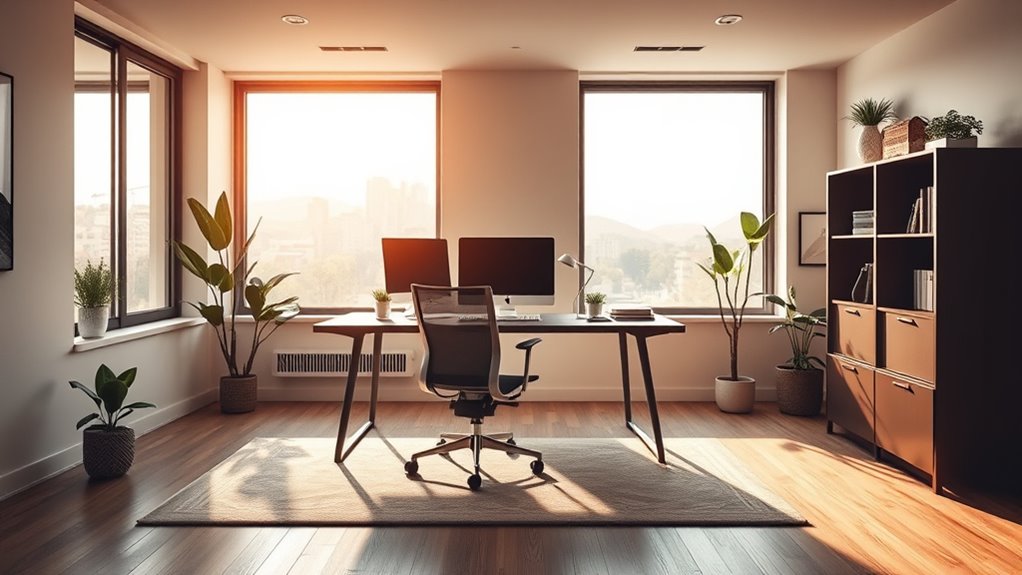
A well-organized spatial layout is essential for maintaining efficiency and reducing distractions in your home office. Your spatial arrangement influences how smoothly you move through your workspace, impacting your productivity. A clear movement flow minimizes unnecessary steps and prevents clutter from blocking essential areas. Position your desk so that everything you need is within easy reach, and keep high-traffic zones free of obstacles. Separate your work zone from other areas to create a mental boundary between work and relaxation. When movement flow feels natural and unobstructed, you’ll find it easier to stay focused and accomplish tasks without frustration. A thoughtful spatial layout not only enhances your comfort but also fosters a more disciplined work routine, ultimately boosting your productivity and well-being.
Break Areas and Their Effect on Restorative Productivity

Why do some break areas boost your productivity while others drain your energy? The answer lies in break area design and the creation of restorative zones. Well-designed spaces help you recharge, while poorly planned ones can be distracting or draining. To optimize your break areas, consider these key factors:
- Comfort: Use ergonomic furniture to promote relaxation.
- Ambiance: Incorporate calming colors and natural light.
- Distraction-Free Zones: Minimize screens and noise for true mental rest.
- Nature Elements: Add plants or views of greenery to enhance restorative effects.
Tips for Transforming Your Home Office Into a Productivity Hub
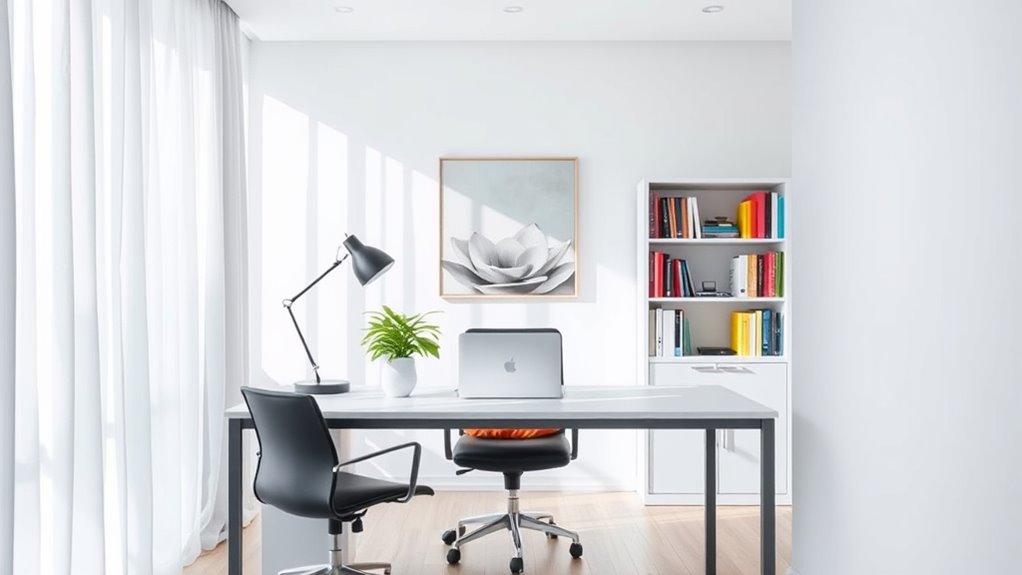
Transforming your home office into a productivity hub starts with creating a dedicated, organized space that minimizes distractions and promotes focus. Focus on workspace aesthetics by choosing calming colors, good lighting, and clutter-free surfaces, which align with productivity psychology principles. A clean, inviting environment reduces stress and helps you stay engaged. Invest in ergonomic furniture to boost comfort and efficiency. Keep essential tools within reach to prevent interruptions. Personalize your space with inspiring elements that motivate you without overwhelming the senses. Remember, a well-designed workspace encourages positive habits and mental clarity. Regularly declutter and adjust your setup based on what works best for your workflow. These small changes will turn your home office into a motivating, productivity-enhancing environment.
Frequently Asked Questions
How Does Proximity to Household Distractions Influence Work Focus?
Proximity to household distractions, like noise distractions, can markedly impact your ability to focus. When your workspace isn’t spatial separation from these disruptions, it’s harder to maintain concentration. You might find yourself frequently interrupted or mentally shifting gears, which reduces productivity. Creating a designated, quiet area can help minimize these distractions, allowing you to stay engaged and work more efficiently, even when household noises are unavoidable.
Can Background Music Improve or Hinder My Home Office Productivity?
You might wonder if background music helps or hinders your work. Music distraction can break your sound concentration, making it harder to focus on tasks. However, for some, calming tunes boost motivation and mask household noise, improving productivity. It depends on your preferences and the type of work. Try experimenting with different genres to find what enhances your focus without becoming a music distraction.
What Are the Psychological Effects of Workspace Scent Choices?
Imagine walking into your workspace, where a subtle scent instantly sparks sensory stimulation. Your choices of aroma can evoke powerful scent memory, influencing your mood and focus without you realizing it. A calming lavender might reduce stress, while energizing citrus can boost alertness. Your scent choices subtly shape your mental state, making your environment either a haven of productivity or a source of distraction. The psychological effects are more profound than you think.
How Does Natural Versus Artificial Light Impact Mental Alertness?
Natural light boosts your alertness levels by enhancing lighting quality, making you feel more awake and focused. It helps regulate your circadian rhythm, so you stay alert during the day. Artificial light, especially poor-quality or overly harsh lighting, can cause eye strain and fatigue, reducing your mental sharpness. To maximize productivity, aim for ample natural light and use high-quality artificial lighting that mimics natural daylight.
What Role Does Scent or Aroma Play in Maintaining Motivation?
Imagine scent as a secret key releasing motivation—aroma therapy taps into your scent memory to boost focus. When you choose uplifting aromas like citrus or peppermint, you create an environment that energizes your mind. These scents can reinforce positive work habits, making motivation feel natural. By harnessing scent memory through mindful aroma choices, you turn your workspace into a motivational sanctuary, keeping you engaged and productive all day long.
Conclusion
Your home office truly shapes your productivity—research suggests that a well-organized, comfortable space boosts focus and creativity. When you optimize lighting, colors, and ergonomics, you create an environment that supports mental clarity. Personal touches and controlled noise levels further enhance motivation. Imagine transforming your workspace into a sanctuary that not only inspires you but also keeps burnout at bay. By making intentional changes, you can turn your home office into your most powerful productivity partner.
